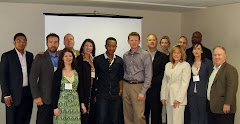This breakout session featured MaryLee Sachs, US Chairman of Hill & Knowlton; Jory Des Jardins, Founder of BlogHer; Gary Spangler of Dupont; and Ted Lowen, Global Director of Communications for BASF
MaryLee began with the question: “With the role of media transforming, how is this affecting brand communications?”
Gary: People are reading traditional press less frequently than they used to. B2B behavior is beginning to match B2C models in that persona references are becoming a more valued way to do business. We’re broadcasting now, but we’re looking to do more engagement.
Jory: My background was in publishing – I was traditional media. But I got hooked in the digital thing during the Web 1.0 days, and blogging gave me a chance to get myself published. Blogging technology began to develop, and as more and more women began to blog they wanted to connect and build their reputation among one another. We saw a lot of interest from marketers to reach this audience, and so we started BlogHer in 2005. Over 2,500 of the bloggers in our network are engaged with brands now, and we have about 50,000 bloggers in the network in all.
Ted: Since 2005 there’s been this velocity in change that’s happening among major media. They’re finally starting to face what’s going on with their business models and there’s a lot of soul-searching and painful transitions going on. They want to understand where social media is going to drive their business in the future.
MaryLee noted that the FDC is starting to look into how bloggers interact with brands, and asked the panelists to comment on the interaction of ethics in the new media world.
Gary: Transparency matters a lot, and brands have shown repeatedly that when they try to enter this space inauthentically, that’s what makes the headlines. New media has opened the channels to gain insights and interact with our audience, but since it’s no longer a one-way correspondence it needs to be done the right way. On a related note, social media is also beginning to affect the way HR works, as younger people are coming into the workforce and expecting to be able to use these new tools.
Jory: I think at this point brands are becoming more comfortable working in a social media context. Recently Forrester released a report supporting sponsor conversations, which is when a brand sponsors a blogger to review a product. But I think we need to be even more specific. There’s no illegal way to do it, but there are emerging practices for what is accepted, especially around context and disclosure. In BlogHer we applied journalistic ethics first to the way our bloggers interact among the network, but then we extended that to how bloggers and brands interact.
Ted: Issues management and reputation protection for your organization still comes down to two words: authenticity and speed. People expect your company to respond online in the way they would in any traditional media format, but what’s changed is the speed in which brands need to respond.
“There’s a difference between reaching the overall top bloggers and reaching your top bloggers," said Jory. "It’s important to get in front of the bloggers who will write about your brand, and want to."
A member of the audience asked how to find the right bloggers, and Jory admitted it’s a manual process that requires you to do your homework. “There are tools to find these things, but there are not shortcuts,” she said. “A lot of times it’s all about following the conversation first, knowing where it’s going, and then reaching these subgroups.”
Gary added that a good way to uncover potential bloggers is to check out who’s talking about your brand on Twitter first, then picking out the best ones after a vetting period.
“The right people are out there,” said Ted, citing an example of how even in the industrial space there are a select few bloggers who get it and write about it, and they’re well read by others in the industry.
For a lot of bloggers, recognition is as good as currency. There is compensation and there is not compensation. For example, we don’t compensate bloggers for talking about a product, but we would pay them for their expertise.
MaryLee’s final question looked to the future and what lies ahead for brands and social media.
“We still have a bias toward traditional marketing tools and techniques, but things are shifting quickly,” Ted said.
Gary found it was important to have someone on board who really understands the space and is able to translate traditional efforts into the digital sphere. And don’t forget to bring a WOM agency into the strategy.
Jory’s parting advice for brands is to start small and build a case for yourself. “The question is no longer should we invest in social media, but how much, and how much do we get back,” she said.
Wednesday, May 20, 2009
Subscribe to:
Post Comments (Atom)







No comments:
Post a Comment